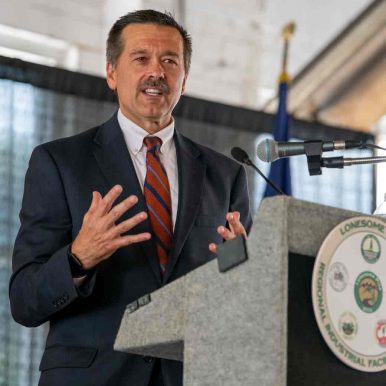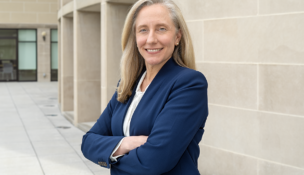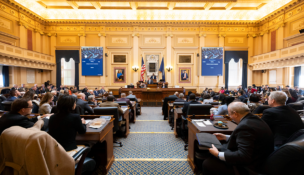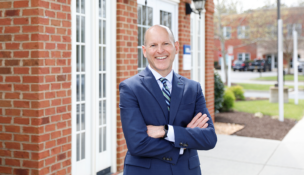Crowded out
Elections overshadow 2023 state legislative agenda
Kira Jenkins //December 29, 2022//
Election years are not the time to make waves in Virginia’s legislature, says Greg Habeeb, a former Roanoke delegate who now advises clients pursuing legislation in the General Assembly.
Big changes — the kind the state saw during the Democrats’ two years of full legislative control in 2020 and 2021 — are expected to be extremely unlikely amid the split, election-year legislature of 2023. “It’ll cause some people to be excessively bold,” but that’s not the natural state of things, says Habeeb, who leads Gentry Locke Attorneys’ government and regulatory affairs team in Richmond. “It’s hard to legislate on the off-off year.”
Odd-year sessions are automatically shorter than even-year sessions, when the state must pass budgets. The Virginia Constitution requires a session of 30 days, traditionally extended to 45 days in odd years, so there’s less opportunity to pass as many bills as with the 60-day session required in even years. Also, this fall, all 140 seats in the House of Delegates and the Virginia State Senate are up for election, and redrawn districts mean 61 incumbents suddenly found themselves sharing districts with other incumbents, setting up a crowded primary field for this spring. (See related story.)
Undoubtedly, lawmakers in Richmond this session will pass some legislation — likely in the areas of renewable energy, education, public safety, workforce development and industrial site development. But “you [can] take the social issues off the table,” including gun control and abortion, Habeeb says. “There’s little to no room for compromise on those.”
That said, Virginia Gov. Glenn Youngkin’s administration is supporting a bill to seek out public school library books with graphic sexual content so that parents can prohibit their children from having access to those materials. Other social-issue legislation being introduced in the House this session includes a measure to make vaccinations optional for public school students. And though it’s almost certain to not make it to the state Senate floor, House Bill 1395 from Del. Marie March seeks to ban all abortions in the wake of last year’s U.S. Supreme Court’s ruling repealing Roe v. Wade.
At least some bills this session are likely to gain traction and some bipartisan support, however.
For instance, there may be some movement toward filling two vacancies in the Virginia State Corporation Commission, the three-judge panel that governs utilities, state-chartered financial institutions, securities, insurance, retail franchising and the Virginia Health Benefit Exchange. In recent years, confirmations have been tied up in partisan strife, and with Judge Judith Williams Jagdmann’s resignation at the end of 2022, only Judge Jehmal T. Hudson remains on the bench.
“With two seats [open], there’s an obvious compromise,” Habeeb says. “The House fills one; the Senate fills one,” although there’s no guarantee that legislators will do that, he adds.
Other areas ripe for compromise include some Youngkin initiatives, such as measures to increase affordable, workforce-priced housing as well as a new agency focused on creating a “one-stop shop” for workforce development efforts.
A perennial subject

The Youngkin administration has proposed creating a state Department of Workforce Development and Advancement to take over 13 programs from eight state agencies, representing most of Virginia’s $485 million workforce efforts. His reorganization plan would move some responsibilities away from the Virginia Employment Commission and the Virginia Community College System.
According to the governor, the state’s workforce development initiatives are spread across 12 agencies, 20 other organizations and 800 programs. Meanwhile, Youngkin says, there are about 300,000 jobs unfilled statewide, and the state’s labor force participation rate was at 63.6% in October 2022, down from 66.4% before the COVID-19 pandemic.
During a December 2022 panel discussion sponsored by the Virginia Chamber of Commerce, Virginia Labor Secretary Bryan Slater called the current state of workforce development in the commonwealth “fragmented [and] siloed.” Virginia needs a “centralized hub … to drive policy, programs data and grants,” he added, and also a stronger focus on how many jobs are being filled through programs and how long people stay in those jobs.
It’s hardly a new idea. James W. “Jim” Dyke Jr., senior advisor for McGuireWoods Consulting LLC and former state secretary of education under Gov. L. Douglas Wilder, recalls that when he was tasked with consolidating the state’s workforce training functions in the early 1990s, “I had a full head of hair and Barry DuVal was the young mayor of Newport News.”
Del. Chris Head, R-Roanoke, is particularly excited about the proposed department. “We’ve spent an awful lot of money on workforce development,” he says, but Virginians often are not aware of training programs, due to a lack of marketing and poor interagency communication. Del. Terry Kilgore, the House majority leader, says Virginia’s workforce infrastructure is “duct-taped together,” compared with other states’ more cohesive approaches.
Also, notes University of Mary Washington political science professor Stephen Farnsworth, “one of the areas in which Virginia has not done well is unemployment assistance.” Kilgore says that if the VEC doesn’t have to worry about workforce training, it will be able to focus on more efficiently handling unemployment claims.
In April 2022, the VEC settled a federal lawsuit filed by three legal aid groups that represented Virginia residents who had struggled to obtain benefits during the height of the pandemic shutdown. The Joint Legislative Audit and Review Commission reported in November 2021 that the VEC had made more than $1.2 billion in incorrect payments during the pandemic.
Dyke hopes the new department could be created “in one fell swoop,” adding that he’s spoken to legislators on both sides of the aisle who support the new department. But Farnsworth says that turf battles could trip up the plan — especially if the community college system loses some authority and resources from the proposal.
While Head says there’s “still a significant amount of discord between Democrats and Republicans in the House of Delegates,” he’s hopeful they will find common ground on the workforce proposal.
Not safe bets
It’s less clear whether Youngkin will find support for some of his other proposals, such as increasing the state’s current budget allocation for helping localities prep industrial sites for megaprojects from $150 million to $500 million, or adding $1 billion in personal and business tax cuts.
“I think every single legislator will agree we need to focus on developing megasites,” Habeeb says, but the governor’s proposed spending increase for site development may face some pushback.
“I’m not sure it’s going to be possible this year,” says Democratic Del. Luke Torian, a member and former chair of the powerful House Appropriations committee, adding it will depend on the amount of budget surplus.
Also, notes Farnsworth, “One of the tensions in Richmond is the governor spending a lot of time on the road. There is always a fear in the legislature that the governor from the other party will be able to launch a national campaign on the backs of [statewide] successes.”
In short, Democrats have political motivation to prevent too many compromises that would make Youngkin appealing to a national audience. In 2022, the governor campaigned for GOP gubernatorial candidates across the nation — trips he said were in exchange for the Republican Governors Association’s support during his campaign. Many political observers, however, say that Youngkin is testing the waters for a potential 2024 presidential campaign.
“Glenn Youngkin’s aggressive national outreach has made compromise less likely in Richmond,” Farnsworth says. “He hasn’t done all that much to encourage compromise.”

Youngkin also has also proposed a $10 million investment to create the Virginia Power Innovation Fund, including $5 million to develop a small modular nuclear reactor (SMR) in Southwest Virginia. (See related story.)
Nuclear energy is one way to help the state fulfill the Virginia Clean Economy Act (VCEA), which calls for all energy in the state to be generated from carbon-free sources by 2050. The VCEA was passed in 2020 by the Democratic-controlled legislature.
Although Democrats intended for this goal to be met primarily through innovations in solar and wind energy, including battery storage, Habeeb says other kinds of energy production — including nuclear — are currently needed to meet the 2050 deadline.
Kilgore is bullish about building a reactor in coal country, where it could easily find a home at an abandoned mine site. “A lot of European countries are relying on nuclear energy,” Kilgore says. “I’m all for clean energy — solar and wind — but we’re going to have to invest in gas, coal and SMRs.”
However, some environmental groups and Democratic Del. Richard C. “Rip” Sullivan Jr., the House’s chief patron of the VCEA, have voiced doubt about the viability of a small reactor in Southwest Virginia, which would take at least 10 years to be productive, the governor has acknowledged.
In an op-ed in the Richmond Times-Dispatch last year, Sullivan wrote: “It is ironic that [Youngkin] would call renewables risky and expensive while trumpeting small modular nuclear reactors (SMRs). Solar and wind projects abound, while commercialized SMRs don’t exist anywhere in the world, because we don’t know how to build or operate them in cost-effective, safe and reliable ways.” [Editor’s note: While there are no SMRs in the United States, a Russian floating nuclear power plant uses two SMRs, and a land-based SMR is under construction in China.]
Casinos and cannabis
Meanwhile, state politicos say it’s a safe bet that Democratic Sen. Joe Morrissey will be doing everything in his power to gain approval this session for bringing a casino to Petersburg.
In October 2022, Petersburg City Council voted in favor of Maryland-based The Cordish Cos. developing a casino there if the General Assembly would allow it. In December 2022, Cordish Cos. officials said the project would include $1.4 billion in total commercial development.
Three years ago, the Assembly passed legislation allowing casinos to be built in five economically challenged Virginia cities — Bristol, Chesapeake, Danville, Norfolk and Richmond. Voters in the first four localities have approved casinos, which are under development, but Richmond voters narrowly defeated a referendum in November 2021, blocking a proposed $565 million casino resort. The next day, Morrissey, whose district includes Petersburg, began working on getting Petersburg a shot at a casino instead of Richmond. His 2022 bill failed, but he’s refiled it for the 2023 session.
Morrissey, who was elected to the state Senate in 2019, says in an interview with Virginia Business (see related January 2023 Q&A with Morrissey) that the region’s previous state legislators were “asleep at the wheel” when negotiations were held in 2018 to determine which Virginia cities could hold casino referendums — and that he would have fought “tooth and nail” for Petersburg.
The casino bid may receive some bipartisan support because Republican Del. Kim Taylor, who represents Petersburg and part of Chesterfield County, is carrying the House version of Morrissey’s casino bill.
Richmond casino proponents are still actively pursuing a second referendum, even if Petersburg also wins the right to build a casino. But two casinos in the region would mean fewer jobs and less revenue for each locality than just one casino, according to the findings of a JLARC report released late last year. And Cordish Cos. officials have said they are not interested in pursuing a Petersburg casino if one is approved in Richmond.
Another adult recreational issue that may come up during this session is regulating commercial sales of cannabis. Following the legislature’s 2020 decriminalization of marijuana, plans for creating a legal retail market are still up in the air, and loopholes for products like delta-8 gummies may also be addressed this year.
Head doesn’t expect an overall resolution on retail marijuana sales this session, although there could be some new medical marijuana legislation. Some Republicans, himself included, consider it “crazy” that marijuana possession was legalized in the first place, Head says, and are not likely to approve further legislation. Morrissey, however, is hopeful for some regulatory measures, calling them “a fiduciary duty,” while Kilgore expects the state Cannabis Control Authority to make recommendations for the 2024 session.
The list of bills that probably won’t be passed this year is long. Limits on abortion and LGBTQ rights — including restrictions on K-12 transgender students participating in school sports — are bound to hit Senate Democrats’ brick wall.
A bill as seemingly anodyne as adjusting state dentist licensing lost its prospective chief co-sponsor’s support “because it’s an election year,” says Republican Del. Phil Scott.
And even in the wake of high-profile mass shootings in recent months at the University of Virginia and a Chesapeake Walmart store, gun-control measures like Morrissey’s proposed ban on assault weapons are unlikely to pass through the GOP-controlled House.
Dyke says that higher education leaders in Virginia may seek more leverage in barring firearms from their campuses, but Habeeb says even that powerful constituency is unlikely to budge Republicans.
U.Va. and Virginia Tech — two schools strongly impacted by gun violence this century — are “so intertwined with their communities, and you can’t put a fence around the universities,” Habeeb says, adding that even if guns are banned from campuses, students and employees could store weapons off-grounds.
Nevertheless, there is a chance, he adds, that the legislature will find common ground this year “in investing in more law enforcement or more funding for mental health.” Both ideas have the support of Youngkin, who has proposed $230 million to expand the state’s behavioral health system.
RELATED STORIES
Gloves off
State Sen. Joe Morrissey battles for Petersburg casino
 The main event
The main event
Redrawn districts become incumbent battlegrounds
T




















